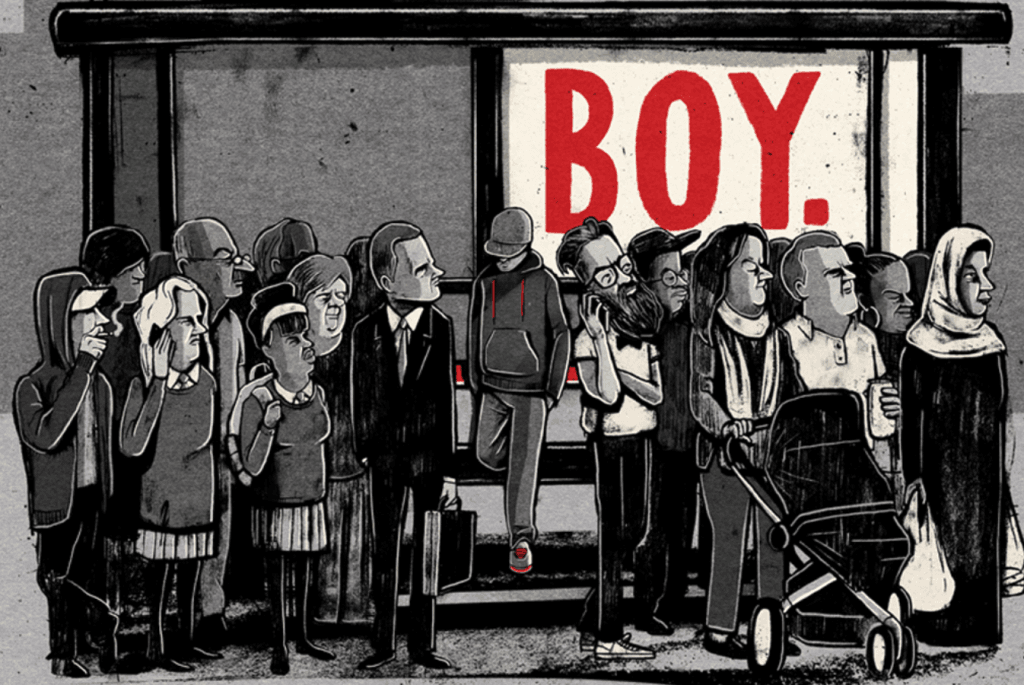Review: Leo Butler’s Boy @ London’s Almeida Theatre
April 21, 2016

Seventy five minutes of nothing. Just watching a kid that you, outside, going about your busy, full, purposeful life, would never even notice.
Imagine if that was your life. In Boy, Leo Butler (writer) and Sacha Ware (director) depict the plight of Liam (played by Frankie Fox), a jobless 17-year-old boy as he drifts helplessly through a day in London. And nothing, in terms of drama, change, story, or event really happens to him or for him. And right there is the pathos, the emotion, the tension, and the heartbreaking reality faced by so many.
White working class males are the ones being failed the most by society; they’re the most likely to be unemployed, leave school early, and commit suicide. One of the biggest lies we are told is that everyone is equal and has the same opportunities in life. Billy Elliot may flicker in the streets outside of Victoria Station, but he’s one of the few. Liam doesn’t see himself in Billy’s shoes, dancing or otherwise.
It’s clear that Liam isn’t a bad kid, or one who will be in trouble or cause tension. He’s lost. With no time, no resources, and no cash, there’s not a lot out there for him. He tries. The job centre send him away because he’s in that limbo between the ages of 16 and 18. The concept of people in school, without any money to support him, seems alien to them.
We see no family, no friends. He tries to hang around with some boys from his year, but they don’t want to know. Even his eight year old sister Misha (Ruby Bridle), mouth dripping with swear words, bullies him as he tries to take care of her. His parents are absent, perhaps because of work. He can’t articulate his needs because he doesn’t know what they are, and no one has ever asked him before. You get a sense of the futility when an acquaintance (Mohammad Amiri) says to Liam, justifying his own lack of action or ambition, “you follow all the dots and that’s it”.
In many ways for this group, you’re where you started – at the bottom and being ignored. A bit like on the stage they move around, endlessly. The set up is innovative and, whilst initially distracting and disorientating, the movement of the slow moving circle travelator becomes like the slogging path that Liam is on. The people merge with the environment, merge with the boy. He’s never seen by the world in which he lives, failed by the social, political, and educational system.
There are moments in which it all becomes a bit uncomfortable. Laughter from around the largely white middle class audience at the characters munching their chicken wings, or teenage slang at the bus stop, builders speaking in Polish, Liam’s attempts to go to Sports Direct, actually feels dirty to be part of. Like ‘poverty porn’ one writer in the Guardian put it. Boys like Liam will never know this theatre is being made about them. That some people are on their side. Not only could they not afford the tickets, or even the tube fare to get there, it’s not something that would enter their consciousness. Growing up with a message that theatre is for other people, you believe it.
But for people like Liam, everything is for other people. Nothing is for him. Nothing to do, nothing to look forward to, he is a boy lost. No purpose. No hopes. Nothing. That’s the drama. The undramatic. A life that is empty and futile. Uncertain, lonely, and vulnerable. At one point the conveyor belt on which he walks goes one way, whilst he goes the other. Nothing like upward social mobility.
We never fully get a back story, or a sense of Liam’s future. Perhaps that’s because no one really cares about the story of young men in this position. The only professional who, despite his total lack of understanding, actually manages to sum up Liam’s problem, albeit unwares, is the doctor who asks Liam to describe his life in five years time.
There’s silence. Blank. Nothing.
In the quiet desperation and lack of words, Boy articulates so much.
You can read more of Francesca at www.andsoshethinks.co.uk and follow her on Twitter at @andsoshethinks.

Comments